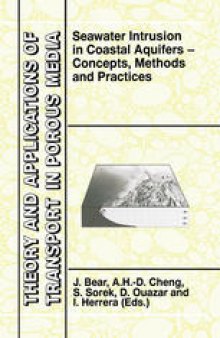 جزییات کتاب
جزییات کتاب
Coastal aquifers serve as major sources for freshwater supply in many countries around the world, especially in arid and semi-arid zones. Many coastal areas are also heavily urbanized, a fact that makes the need for freshwater even more acute. Coastal aquifers are highly sensitive to disturbances. Inappropriate management of a coastal aquifer may lead to its destruction as a source for freshwater much earlier than other aquifers which are not connected to the sea. The reason is the threat of seawater intrusion. In many coastal aquifers, intrusion of seawater has become one of the major constraints imposed on groundwater utilization. As sea water intrusion progresses, existing pumping wells, especially those close to the coast, become saline and have to be abandoned. Also, the area above the intruding seawater wedge is lost as a source of natural replenishment to the aquifer. Despite the importance of this subject, so far there does not exist a book that integrates our present knowledge of seawater intrusion, its occurrences, physical mechanism, chemistry, exploration by geo physical and geochemical techniques, conceptual and mathematical modeling, analytical and numerical solution methods, engineering measures of combating seawater intrusion, management strategies, and experience learned from case studies. By presenting this fairly comprehensive volume on the state-of-the-art of knowledge and ex perience on saltwater intrusion, we hoped to transfer this body of knowledge to the geologists, hydrologists, hydraulic engineers, water resources planners, managers, and governmental policy makers, who are engaged in the sustainable development of coastal fresh ground water resources.



 دانلود کتاب
دانلود کتاب

 جزییات کتاب
جزییات کتاب





 این کتاب رو مطالعه کردید؟ نظر شما چیست؟
این کتاب رو مطالعه کردید؟ نظر شما چیست؟
